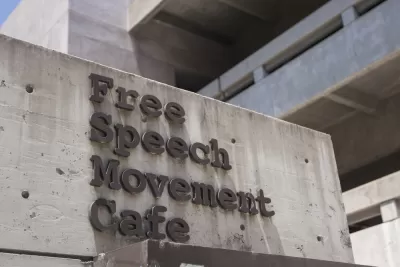The city of Berkeley is suffering the consequences of the urban revival—soaring housing costs and humanitarian crises don't reconcile with the city's famously progressive politics.

Four homeless people have died in the city of Berkeley, California in recent months, challenging "Berkeley’s idea of itself as a bastion of progressive and humanitarian values," according to an article by Rob Waters.
According to that premise, Berkeley's famously left-wing values are clashing with "unyielding economic realities. While upscale restaurants and apartment developments are common, "median rents have soared more than 40% in the past three years, to $3,483 a month," according to data from Zillow. "Meanwhile the homeless population has grown from 680 in 2009 to probably more than 1,000 today," adds Waters. "Strikingly, this is around 1% of the city’s population."
Waters then takes readers on a tour of the ongoing back and froth between "anti-homeless" legislation proposed by the city and the political backlash that usually arises in response. Recently a progressive majority was elected to power at the Berkeley City Council with the promise of change. Since then, the "city set up an emergency operations center to coordinate crisis housing and opened a 47-bed winter shelter, for instance." But, according to Waters, those actions have sparked opposition from some residents, who argue more services will draw more homeless people to the city.
FULL STORY: Berkeley's liberal image in question amid homeless crisis: 'The soul of our city is at stake'

Planetizen Federal Action Tracker
A weekly monitor of how Trump’s orders and actions are impacting planners and planning in America.

Canada vs. Kamala: Whose Liberal Housing Platform Comes Out on Top?
As Canada votes for a new Prime Minister, what can America learn from the leading liberal candidate of its neighbor to the north?

The Five Most-Changed American Cities
A ranking of population change, home values, and jobs highlights the nation’s most dynamic and most stagnant regions.

San Diego Adopts First Mobility Master Plan
The plan provides a comprehensive framework for making San Diego’s transportation network more multimodal, accessible, and sustainable.

Housing, Supportive Service Providers Brace for Federal Cuts
Organizations that provide housing assistance are tightening their purse strings and making plans for maintaining operations if federal funding dries up.

Op-Ed: Why an Effective Passenger Rail Network Needs Government Involvement
An outdated rail network that privileges freight won’t be fixed by privatizing Amtrak.
Urban Design for Planners 1: Software Tools
This six-course series explores essential urban design concepts using open source software and equips planners with the tools they need to participate fully in the urban design process.
Planning for Universal Design
Learn the tools for implementing Universal Design in planning regulations.
New York City School Construction Authority
Village of Glen Ellyn
Central Transportation Planning Staff/Boston Region MPO
Institute for Housing and Urban Development Studies (IHS)
City of Grandview
Harvard GSD Executive Education
Regional Transportation Commission of Southern Nevada
Toledo-Lucas County Plan Commissions




























